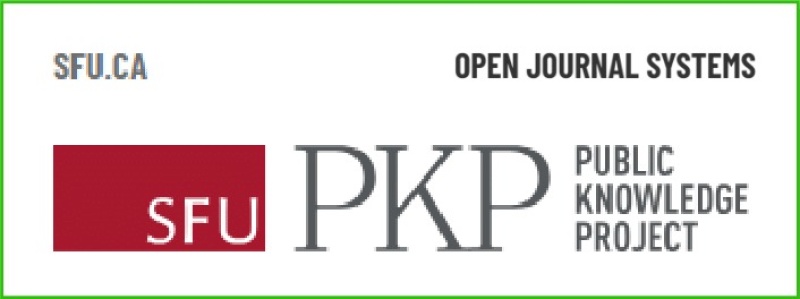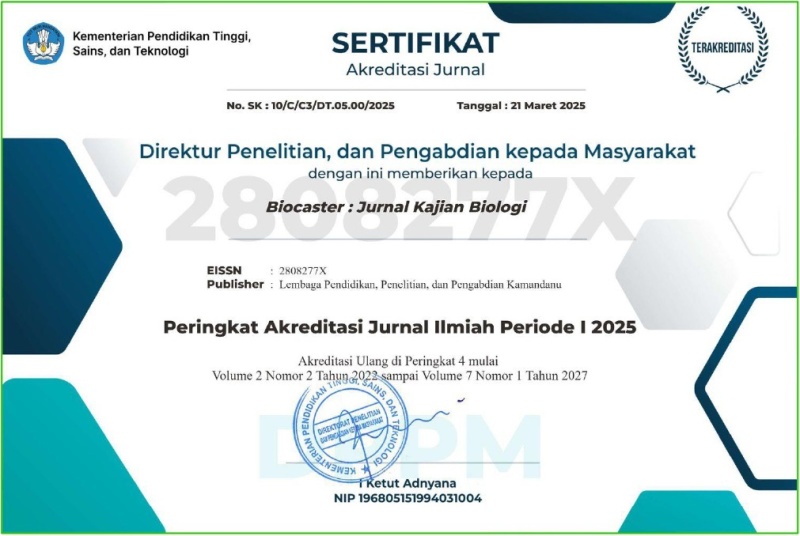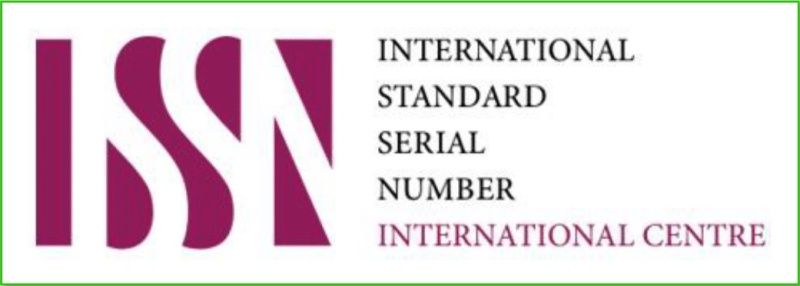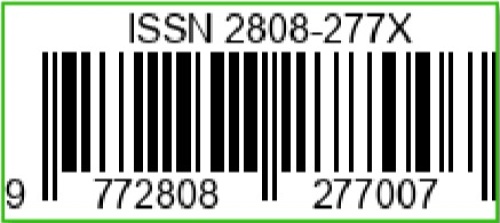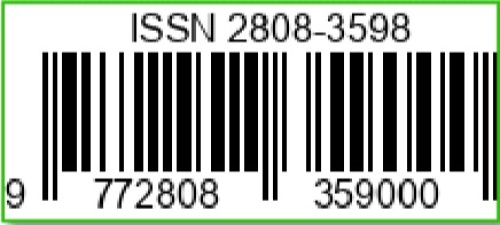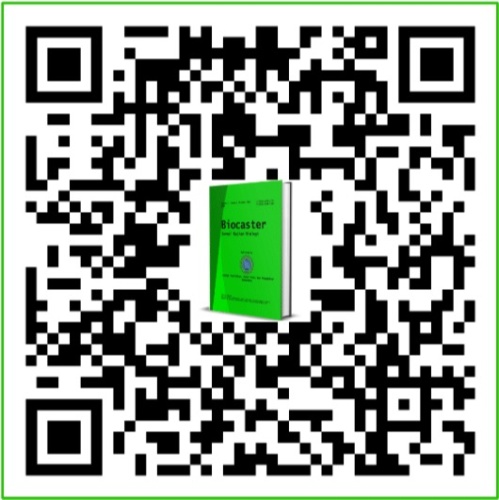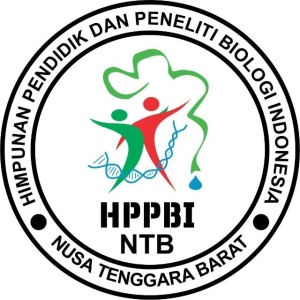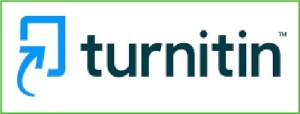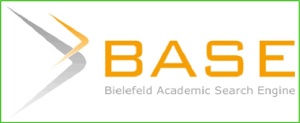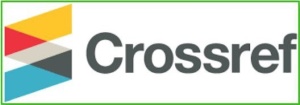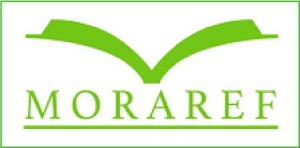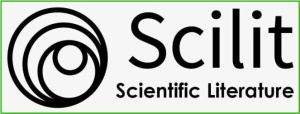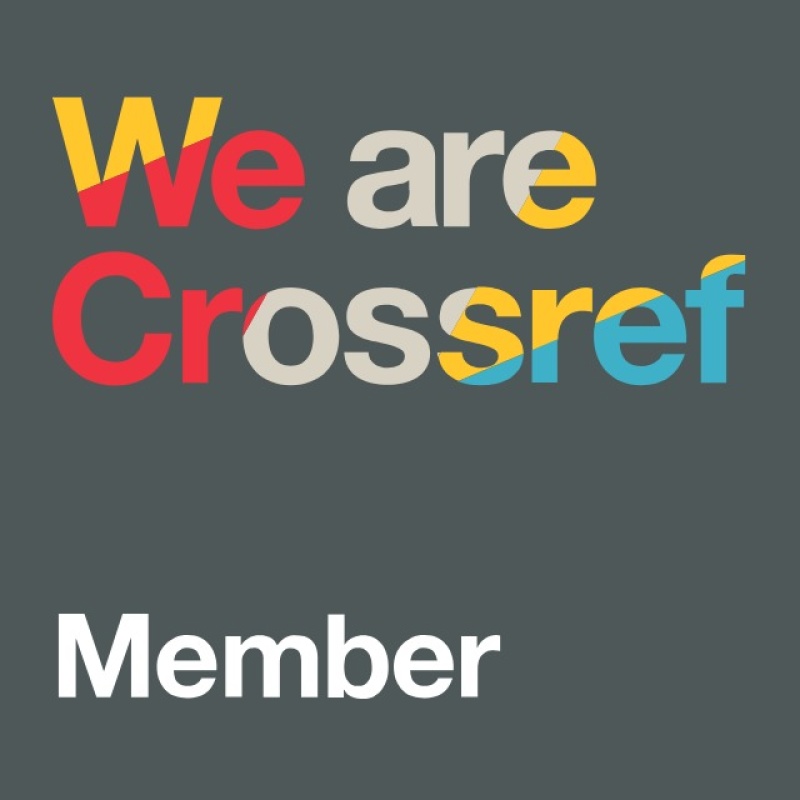Pengaruh Implementasi Pembelajaran Berbasis AR Model Pembelajaran PjBL terhadap Keterampilan Bertanya dan Berpikir Kritis Siswa Materi Sistem Reproduksi Kelas XI SMA Negeri 14 Samarinda
DOI:
https://doi.org/10.36312/biocaster.v5i3.485Keywords:
Augmented Reality, Critical Thinking, Questioning Skills, Project-Based LearningAbstract
This study aims to test the effectiveness of the use of Augmented Reality (AR) technology in the Project Based Learning (PjBL) model on improving students' questioning and critical thinking skills. The method used is a quasi-experimental method with a non-equivalent control group design. The subjects of the study were students of grade XI SMAN 14 Samarinda who were divided into an experimental class and a control class, each consisting of 20 students. The research instruments used were essay tests, observation sheets, and documentation. The data analysis techniques used were descriptive statistics (mean and standard deviation), N-Gain test, t-test (Independent Sample T-Test), and Normality & Homogeneity test using SPSS 25 for Windows. The results of the analysis showed a more significant increase in skills in the experimental class compared to the control class. The N-Gain value of the experimental class' questioning skills was 0.46 (moderate category), while the control class was 0.21 (low). For critical thinking, the experimental class obtained 0.51 (moderate), higher than the control class 0.33 (moderate). These findings indicate that AR integration in PjBL effectively improves questioning and critical thinking skills, and contributes to 21st century learning innovation.
Downloads
References
Astuti, C. P., Haryati, T., & Wuryandini, E. (2024). Pemanfaatan Teknologi Digital untuk Peningkatan Mutu Pendidikan di SMP Negeri 2 Sulang Rembang. Innovative : Journal of Social Science Research, 4(6), 8519-8528. https://doi.org/10.31004/innovative.v4i6.17318
Baskoro, B., Gunaryati, A., & Rubhasy, A. (2023). Klasifikasi Penduduk Kurang Mampu dengan Metode K-Means untuk Optimalisasi Program Bantuan Sosial. Infomatek : Jurnal Informatika, Manajemen dan Teknologi, 25(2), 41-48. https://doi.org/10.23969/infomatek.v25i1.7271
Bloom, B. S. (1956). Taxonomy of Educational Objectives: The Classificationm of Educational Goals. London: David McKay Company, Inc.
Budiarti, N. I. (2022). Merdeka Mengajar Platform as a Support for the Quality of Mathematics Learning in East Java. Matematika dan Pembelajaran, 10(1), 13-25. http://dx.doi.org/10.33477/mp.v10i1.2858
Darsyah, D. (2023). Konsep Dasar Belajar dan Pembelajaran dalam Pendidikan. Jurnal Pendidikan dan Konseling, 5(2), 857-861.
Facione, P. A. (2015). Critical Thinking: What it is and Why it Counts. California: Academic Press.
Faslia, F., Aswat, H., & Aminu, N. (2023). Pelibatan Model Projek Based Learning pada Pembelajaran Ilmu Pengetahuan Sosial (IPS) Menuju Pelajar Pancasila pada Jenjang Sekolah Dasar. Jurnal Basicedu, 7(6), 3895-3904. https://doi.org/10.31004/basicedu.v7i6.6623
Fatih, M., Alfi, C., & Muqtafa, M. A. (2024). Science Learning Game (SLG) Based on Augmented Reality Enhances Science Literacy and Critical Thinking Students Skills. Jurnal Penelitian Pendidikan IPA, 10(2), 975-979. https://doi.org/10.29303/jppipa.v10i2.6107
Foster, N., & Schleicher, A. (2022). Assessing Creative Skills. Creative Education, 13(1), 1-29. https://doi.org/10.4236/ce.2022.131001
Hake, R. R. (1999). Analyzing Change/Gain Scores. In an American Educational Research Association (Division D), Measurement and Reasearch Methodology (pp. 229-455). Bloomington, United States of America: Department of Physics, Indiana University.
Hanik, E. U., Puspitasari, D., Safitri, E., Firdaus, H. R., Pratiwi, M., & Inayah, R. N. (2022). Integrasi Pendekatan TPACK (Technological, Pedagogical, Content, Knowledge) Guru Sekolah Dasar SIKL dalam Melaksanakan Pembelajaran Era Digital. JEID : Journal of Educational Integration and Development, 2(1), 15-27. https://doi.org/10.55868/jeid.v2i1.97
Indriani, R., Wahidin, W., & Arip, A. G. (2023). Pengembangan Model Project Based Learning (PjBL) Berbantuan Augmented Reality (AR) untuk Meningkatkan Keterampilan Proses Sains dan Sikap Ilmiah Peserta Didik Kelas XI pada Materi Struktur Sel. Edubiologica : Jurnal Penelitian Ilmu dan Pendidikan Biologi, 10(2), 23-32. http://dx.doi.org/10.25157/jwp.v10i2.11217
Kuswinardi, J. W., Rachman, A., Taswin, M. Z., Pitra, D. H., & Oktiawati, U. Y. (2023). Efektivitas Pemanfaatan Aplikasi Augmented Reality (AR) dalam Pembelajaran di SMA: Sebuah Tinjauan Sistematis. Jurnal Review Pendidikan dan Pengajaran, 6(3), 556-563.
Lismaya, L., Priyanto, A., & Ayu, P. (2022). Application of Augmented Reality Through a Scientific Approach to Students’ Critical Thinking Ability. Indonesian Journal of Learning and Instruction, 5(1), 33-35. https://doi.org/10.25134/ijli.v5i1.5874
Listiawan, B., Sukamto, K., & Dewi, R. (2022). Pengembangan Media Pembelajaran Berbasis Augmented Reality pada Materi Bangun Ruang. Jurnal Pendidikan dan Pembelajaran Matematika, 7(1), 55-63. https://doi.org/10. 29100/jp2m.v8i2.3637
Muliana, M., & Nufus, H. (2024). Improving Critical Thinking Skills Through a Problem Based Learning (PBL) Approach Based on Augmented Reality (AR) at SMAN 1 Seunuddon. International Journal of Trends in Mathematics Education Research, 7(4), 31-39. https://doi.org/10.33122/ijtmer.v7i4.340
Noer, D. (2025). Implementasi Project Based Learning pada Kurikulum Merdeka. J-PiMat : Jurnal Pendidikan Matematika, 7(1), 1717-1726. https://doi.org/10.31932/j-pimat.v7i1.4663
Octavia, N. (2021). Augmented Reality to Improve Critical Thinking Skills in Science Learning. In SHEs: Conference Series (pp. 861-866). Surakarta, Indonesia: Universitas Sebelas Maret.
Pristiwanti, D., Badariah, B., Hidayat, S., & Dewi, R. S. (2022). Pengertian Pendidikan. Jurnal Pendidikan dan Konseling, 4(6), 7911-7915. https://doi.org/10.31004/jpdk.v4i6.9498
Rahmatullah, A. (2023). Peningkatan Kompetensi TPACK Guru Melalui Pelatihan Pengembangan Media Pembelajaran Berbasis Augmented Reality. Jurnal Pengabdian Masyarakat Nusantara, 9(2), 45-53. https://doi.org/10.35870/jpmn .v3i2.1856
Rahmawati, U., & Salimah, K. F. (2024). Augmented Reality pada Pembelajaran IPA Berbasis Proyek untuk Mengembangkan Critical Thinking Siswa SMP. In Prosiding Seminar Nasional IPA XIV (pp. 622-631). Semarang, Indonesia: Universitas Negeri Semarang.
Sarnoto, D., Hasanah, L., & Putri, S. A. (2023). Analisis Penerapan Teknologi dalam Pembelajaran dan Dampaknya terhadap Hasil Belajar. Journal on Education, 15(1), 112-119. https://doi. org/10.31004/joe.v6i1.2915
Siskayanti, W. D., Nurhidayati, S., & Safnowandi, S. (2022). Pengaruh Model Problem Based Instruction Dipadu dengan Teknik Probing Prompting terhadap Kemampuan Berpikir Kritis dan Hasil Belajar Kognitif. Panthera : Jurnal Ilmiah Pendidikan Sains dan Terapan, 2(2), 94-112. https://doi.org/10.36312/pjipst.v2i2.76
Sukasih, S., Wulandari, D., & Permana, Z. F. (2022). The Effectiveness of Augmented Reality Book to Improve Critical Thinking Ability at Elementary School Students. Journal of Education for Sustainability and Diversity, 1(1), 22-24. https://doi.org/10.57142/jesd.v1i1.2
Suleman, M. A., & Idayanti, Z. (2023). Analisis Faktor-faktor yang Mempengaruhi Keberhasilan Pembelajaran Berbasis Teknologi. Jurnal Basicedu, 7(6), 3559-3570. https://doi.org/10.31004/basicedu.v7i6.6368
Syafriani, D., Sahputri, A. A., Alyanti, D., Ramadani, D. S., & Pardosi, K. T. (2025). Pembelajaran Kurikulum Merdeka di Indonesia. JAHE : Jurnal Akuntansi Hukum dan Edukasi, 2(1), 22-31. https://doi.org/10.57235/jahe.v2i1.5753
Umroh, H., Rijal, S., & Yunus, F. M. (2025). Mereformasi Pendidikan : Mengkaji Rendahnya Kemampuan Berpikir Kritis Siswa Melalui Pendekatan Pendidikan Kritis Ivan Illich. Aspirasi : Publikasi Hasil Pengabdian dan Kegiatan Masyarakat, 3(1), 18-32. https://doi.org/10.61132/aspirasi.v3i1.1306
Downloads
Published
How to Cite
Issue
Section
License
Copyright (c) 2025 Salsabila Royani Putri Ramadhani, Masitah, Herliani, & Vandalita Magdalena Maria Rambitan

This work is licensed under a Creative Commons Attribution-ShareAlike 4.0 International License.
-
Attribution — You must give appropriate credit, provide a link to the license, and indicate if changes were made. You may do so in any reasonable manner, but not in any way that suggests the licensor endorses you or your use.
-
ShareAlike — If you remix, transform, or build upon the material, you must distribute your contributions under the same license as the original.


